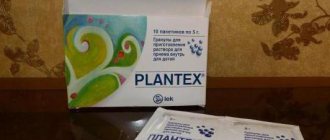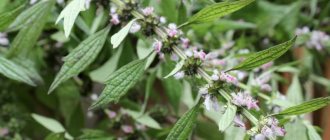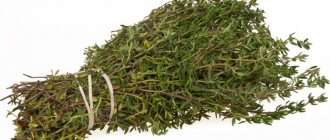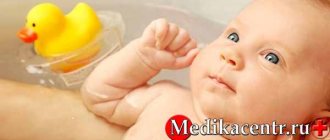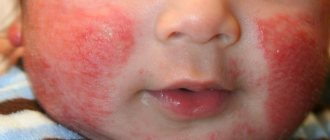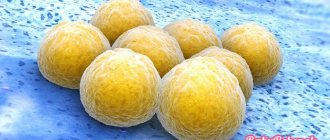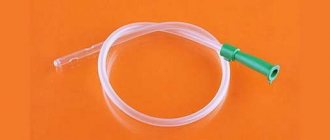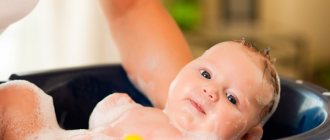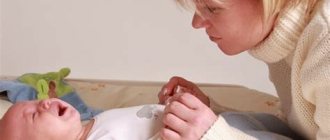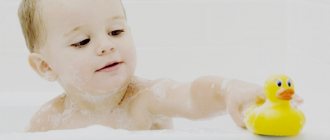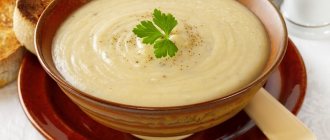One of the most exciting moments associated with the arrival of a baby in the family is his first water procedure. Young parents have a lot of questions: what kind of water to bathe their newborn baby in, how to hold it, whether it is necessary to swaddle before bathing, how long bathing should last and how often to bathe at all. When preparing a bath for your baby, use plain unboiled tap water. The temperature of the water should be approximately equal to the baby’s body temperature and not cause him any discomfort.
Many parents, on the advice of doctors, their own parents, and friends, choose to bathe their child in herbs, because they are gifts of nature. Herbal soothing baths and baths against skin inflammation are especially popular. Preparing baths involves certain nuances.
Characteristic
The action of motherwort is:
- General strengthening, relaxing effect;
- Strengthening the protective properties of the body;
- Decreased heart rate;
- Stimulating digestive activity;
- Elimination of spasms and cramps;
- Sedative effect;
- Reducing blood pressure;
- Normalization of sleep;
- Diuretic effect.
The drug has a strong effect on the nervous system; extreme caution should be given to babies under 3 months of age.
Indications
Motherwort has a broad effect and is prescribed for:
- sleep disorders;
- overexcitement;
- nervous disorders;
- epilepsy;
- reduction of the body's defenses;
- heart rate disturbance;
- diseases of the circulatory system and blood vessels.
In infants, motherwort-based medicines are more often used if the following syndromes are diagnosed in the baby.
Hyperactivity
Hyperactivity, characteristic of infants with serious disorders of the central nervous system. Accompanied by increased nervous excitability and excessive motor activity. Children with this disorder react painfully to short-term absence of their mother; they have difficulty concentrating, which leads to developmental delays.
Nervous excitability
“Restless child”, which is accompanied by increased nervous excitability. The phenomenon is quite common and is observed in almost half of children. In an infant, one of the symptoms is the spontaneous Moro reflex. It is characterized by throwing up the arms even without exposure to external stimuli. At the same time, the baby’s fingers are spread out like a fan.
Additional symptoms
Additional symptoms include: restlessness when awake, sleep disturbance, muscle hypertonicity, trembling of arms and legs, tremor of the chin. In one-year-old children, the condition is accompanied by excessive talkativeness and increased activity (a large number of aimless movements of the head and limbs). Children with this syndrome find it difficult to concentrate and play calm games.
When using motherwort, you need to take into account contraindications, the age of the child, and the use of other medications. It is not recommended to prescribe the drug without consulting a doctor.
Useful properties and types of decoctions
The most versatile and widely used plant for decoctions is, of course, chamomile.
The line lags behind her a little. Often this is where the fantasy of young parents ends. But there are a number of other useful plants, whose names completely unfairly remain in the shadows.
Let's take a closer look at the types of medicinal herbs that have a beneficial effect on the body of babies, and also learn about their main properties.
Chamomile
It is not for nothing that people love it so much, because chamomile flowers and their extract are widely used not only in medicine, but also in cosmetology. The anti-inflammatory effect of the plant can help with colds and in the fight against skin imperfections. Chamomile tea is allowed to be given even to babies, and a decoction of it, added to a baby bath, will have a mild soothing effect not only on the baby’s skin, but also on his nervous system.
Chamomile tinctures will quickly cope with irritation and diaper rash on a child’s body, because it has a pronounced antibacterial effect. This plant goes well with other herbs.
Series
This is an indispensable and first assistant in the treatment of childhood skin diseases. The line is used for bathing children whose bodies often develop diaper rash, prickly heat, or various types of dermatitis. It is even successfully treated with.
The plant has an immunostimulating effect and strengthens the children's body. To enhance the healing effect, many parents also use succession oil. It is applied to the affected areas of the skin, thereby accelerating the healing process.
This is interesting
: many parents still believe that this herb can scare away evil spirits and protect the child from damage and the evil eye. In the old days, superstitious mothers placed dried leaves and flowers of the string in small bags, and then hid them near the baby's cradle. The line could be found in every village house. Decoctions from it were taken internally to get rid of colds.
You should not boil herbs in boiling water.
Lavender
This aromatic tincture will come to the rescue if your baby is bothered by skin wounds when diaper rash does not heal for a long time. If a child has been severely bitten by mosquitoes in the summer, then an evening bath with a decoction of lavender will help him get rid of the unpleasant itching, and scratched and bleeding wounds will begin to heal much faster.
The plant also has a sedative and analgesic effect, which will be very important if the baby is bothered by inflammation on the skin.
St. John's wort
Another irreplaceable and emergency assistant in the fight against most skin diseases. Unlike the previous ones, its most important property is to significantly increase the regeneration of the skin. In other words, regularly bathing your baby in water with St. John's wort tincture will help to heal faster:
- abrasions,
- wounds,
- injured areas.
Severe diaper rash will begin to heal more actively. And besides this, St. John's wort will also disinfect the skin to prevent bad bacteria from multiplying and prevent new inflammations.
Motherwort
A decoction of it will save you in situations where a child is tormented by regular intestinal colic or severe digestive problems.
It has successfully established itself as an effective folk medicine for combating gastrointestinal disorders. It is consumed not only internally, but also added to bathing water. A tincture from this plant will be an excellent addition to a relaxing baby tummy massage.
Peppermint
It not only has a specific pleasant aroma, but also calms the nervous system well, relieving muscle tone, relaxing the baby’s muscles. This tincture, used for bathing before bed, will put the baby in a peaceful mood and have a mild sedative effect.
In addition, mint improves appetite and helps reduce nausea. A bath with mint infusion is indicated for children suffering from underweight who are reluctant and eat poorly.
Peppermint has a sedative effect.
Oregano
This herb with beautiful lilac flowers is used for colic in babies and helps relieve pain. Like mint, oregano has a pronounced ability to have a sedative effect and relaxes the child’s muscles.
It is especially recommended for bathing nervous, easily excited, poorly sleeping and often crying children. In combination with other drugs, baths with oregano help with hypertension and are used to treat childhood neuroses.
For many parents, bathing a baby causes anxiety. They will help make the process easier. Their purchase is especially important for parents who bathe their babies alone. How to prepare for the first water procedure, and what should be the water temperature for bathing a newborn. This knowledge will make the task easier for parents.
Pine extract
Baths using it are popular among those parents whose children have increased nervousness.
The healing properties of pine needles help to even out the functioning of the heart, eliminate nervous excitement and neuroses. After pine baths, children sleep better and longer, and their brain activity improves. Pine needle extract also helps in the treatment of respiratory diseases and has a strengthening effect on the baby’s upper respiratory tract and its immune system.
Watch a video on how to brew herbs for bathing babies:
This is interesting: in the old days, to prevent respiratory and cold diseases, it was customary to walk with children in a coniferous forest, if it grew nearby. In cases where the child did get sick, fresh spruce branches were brought into the house so that the baby’s body could cope with the illness faster and the airways would be cleared.
And finally...
Nature has given us everything we need to keep us and our loved ones healthy. Learn to use traditional healing plants wisely. Remember that the human body’s ability to fight diseases begins in early childhood!
Soothing remedies based on medicinal plants are popular among adults. They are considered effective and safest for health. Is it possible to give motherwort to a baby?
Contraindications
Cases when motherwort cannot be used are specified in the instructions. Be sure to familiarize yourself with them before use. Contraindications are:
- Slowing the heart rate;
- Low blood pressure;
- Therapy with sedatives. Motherwort enhances their effect;
- Individual intolerance;
- Stomach diseases, gastritis with high acidity.
By-effect
Side effects of this drug can be caused by interactions with other drugs, overdose, or long-term use. They may appear with low weight in young children or individual intolerance. Side effects may include:
- From the gastrointestinal tract - dry mouth, belching, frequent regurgitation, indigestion;
- Disorders of the nervous system. Manifested by lethargy, decreased activity, apathy, drowsiness;
- An allergic reaction in the form of swelling, rash, hives, redness.
In case of overdose, immediate medical attention is required. In case of minor side effects, use should be stopped until consultation with a pediatrician.
Many parents are frightened by the age limit in the instructions for the drug - it is officially approved from 12 years of age. This relieves the manufacturer of responsibility for possible side effects in case of incorrect dosage for children. In the absence of contraindications, the pediatrician can individually prescribe motherwort for the treatment of infants.
Alcohol tincture
It is not recommended to take it orally until the age of three; at older ages, 1-2 drops are diluted in 100 ml of water and given to the child 3 times a day. The taste of the tincture is bitter; it is permissible to mix it with sweet warm tea. It should not be used to treat a newborn due to the negative effect of alcohol on the liver, which experiences increased stress after birth (often manifested by jaundice).
For anxiety or nervous disorders in infants, you can add the product to the bathtub for bathing babies (20 drops per 1 liter).
Ways to prepare a decoction for bathing a child
It is better to prepare infusions in enamel and glass containers. Pharmacies offer two ways to pack herbs: in bulk and in filter bags. In the first case, the solution is prepared from 3 tbsp. l. herbs, filled with 3 liters of hot water. The container is closed with a lid and additionally wrapped in warm cloth.
The decoction is usually prepared 1-1.5 hours before bathing the baby. Before adding to the bath, filter the decoction to prevent plant fragments from getting into the water. The strained broth is poured into a bath of water.
Herbs in filter bags must be brewed at the rate of 5 bags per 1-1.5 liters of hot water. Do not make a strong decoction; the total mass of dry herbs should not exceed 30 g, otherwise sensitivity may occur.
Decoction
How to brew dry motherwort herb? For children under two years of age, it is necessary to use a proportion of 1 teaspoon per glass of boiling water. The product is infused covered for about an hour. The resulting drink is given to the child three times a day, 2 teaspoons. You can dilute it with sweet water if the baby refuses to take the infusion because of the bitter taste. The decoction is also added to baths in the proportion of 1 glass per 1 liter of water.
The exact dosage is determined by the doctor individually. Depending on the clinical picture, it can be reduced or increased. Reviews say that the reaction to motherwort is individual. Due to the immaturity of the nervous system, it can be the opposite of what is desired and cause overexcitation in the baby.
Moneybox of knowledge
Healing baths with motherwort decoctions are indicated for many diseases. They give an excellent effect for diseases such as arterial hypertension. This disease is characterized by the fact that the patient's blood pressure is constantly elevated. Currently, medications that lower blood pressure are recommended for the treatment of hypertension. But, however, such drugs do not normalize carbohydrate metabolism in the body. Their effect mainly extends only to the temporary normalization of water-salt metabolism and the expansion of the peripheral vascular system. But all these beneficial changes occur in the body only for a few hours, which means that then the medication has to be repeated. In addition, the use of certain medications may have unwanted side effects.
Healing baths with motherwort infusions
With this in mind, hypertensive patients are advised to turn their attention to other forms of treatment for this disease. Using a bath containing motherwort infusion, you can, firstly, improve capillary blood circulation, and secondly, normalize metabolic processes in the body.
For hypertension, hyperthermic baths with motherwort infusion will have an excellent effect on the body. Hyperthermic baths must be taken before bedtime. If the bath is taken during the day, then the patient should rest after the bath for at least three hours. Also, such a bath should be taken at least 1.5 hours before meals. Water is poured into the bath, an infusion of motherwort is added (how to prepare it will be discussed below) and the temperature of the water in the bath is determined using a thermometer.
The initial temperature should be 36-37 degrees. The patient should be immersed in water at exactly this temperature. Then gradually over 10-15 minutes the temperature of the water in the bath is brought to 41-43 degrees. At this temperature, you should stay in the water for 4-5 minutes, and then get out of the bath, wrap yourself in a bath sheet and blanket, go to bed, cover yourself with another blanket and lie there for half an hour. After taking a bath, be sure to drink some hot drink - tea with honey or raspberry jam, hot chamomile infusion. The patient will definitely sweat. Half an hour after the procedures, you need to wipe your body from sweat, change clothes and go to bed. You should rest in bed for at least 2 hours. You can prepare the decoction in this way: pour 100 g of dry motherwort herb into 1 liter of boiling water and boil for 10 minutes, then cover the container with a lid and leave the decoction for another half hour. The decoction should be filtered and added to the bath water.
Some of our readers may doubt the safety of such a procedure as a hypothermic bath. This is completely baseless. If this procedure is carried out correctly, that is, the temperature of the water in the bath rises gradually - by about 1 degree every 2 minutes, then the unpleasant sensations will be eliminated. In addition, there are absolutely no harmful changes in the activity of the cardiovascular system. If the patient feels too uncomfortable in a hot bath, then the upper limit of the water temperature can be reduced to 38-39 degrees. You need to know that if a sharp change in temperature is contraindicated for hypertensive patients, then gradual warming in the bath, on the contrary, causes a decrease in blood pressure, because the capillaries of the skin and the capillaries of the internal organs expand.
If the healing procedure is carried out correctly, it will have a positive effect on patients with hypertension, improve the functioning of the heart muscle, metabolism in the body, increase body temperature, and therefore the bactericidal properties of the blood. Do not forget that motherwort has a sedative effect, three times greater than that of valerian, which means that baths with motherwort decoction will definitely help with cardiovascular nervousness, insomnia, calm you down after a hard day, and relieve nervous tension.
It is best to take soothing baths in the evening, when a hard day is behind you and you simply need to relieve nervous tension. If you want to get rid of insomnia or calm the central nervous system with the help of baths with motherwort decoction, then you can advise taking a warm bath.
First, prepare a decoction of motherwort. Take 50 g of dry motherwort herb, pour 1 liter of boiling water, put on low heat and boil for 10 minutes, then close the container with a lid and leave for 20 minutes. The broth must be filtered and added to water. The temperature of the water in the bath should not be too high; it is best if it is 37-38 degrees. You can take a bath for 20-30 minutes, and then you should definitely rest. Half an hour after taking a bath, you can drink a glass of warm milk or a little warm decoction of motherwort, valerian, dill, and peppermint herbs. Sometimes a nervous condition is due to the fact that a woman has entered menopause. This is a period that begins in women between 45 and 50 years old and is caused by changes in the body. Menstruation gradually stops, the activity of the uterus and ovaries fades away. During this period, symptoms such as a feeling of heat, headache, irritability, insomnia, and a sharp decrease in performance may be observed. Age-related changes in the body can last even several years. How strong certain disorders are depends on the organism itself.
For women who lead a sedentary lifestyle, who have an extremely unstable psyche, or who suffer from some diseases, the menopause can be complicated. After all, at this time existing diseases may worsen or new ones may arise. Extreme instability of the emotional state may also be observed. For example, a woman can become very upset over trifles, and then suddenly, against the backdrop of a bad mood, causeless cheerfulness arises, which can just as quickly be replaced by causeless fears or anxiety. During this period, a woman especially needs support from loved ones. She herself needs to develop a reasonable attitude towards her condition, she should not be led by her mood, and try to remain calm in any life situations. You should be especially careful about your health. With the help of therapeutic procedures, you can try to alleviate your physical and emotional condition.
During menopause, it is especially important to follow a daily routine, not to overwork, spend more time outdoors, and follow a diet that excludes the consumption of large quantities of tea, coffee, alcohol, and contains more fruits, vegetables, and dairy products. Walking before bed, contrast showers, rubbing with cool water, and medicinal baths are also useful.
Therapeutic baths with motherwort decoction will help a woman relieve strong excitement of the nervous system, unreasonable fears, and sudden changes in mood. You can prepare decoctions for baths simply from motherwort, or you can use motherwort as a component of herbal teas for decoctions. Motherwort decoction: take 70 g of motherwort, pour boiling water (1 liter), boil for 10 minutes, and then lower the bowl with the infusion into another, large saucepan in hot water. Leave for 1 hour. Then strain the broth and use it as a bath additive. A decoction of motherwort herb and lovage roots: take 300 g of lovage roots, pour 1 liter of cold water and leave for several hours. It is best to leave it to steep overnight. Then put the infusion on low heat, add 50 g of dry motherwort herb and boil for 30 minutes. Cool the broth under the lid. Add at least 1 glass to the bath. This decoction can be used during menopause; it also helps well with diathesis, neuroses and eczema. It is better to take a bath at night, and if you decide to take a bath during the day, then you should rest for at least 3 hours after it. The temperature of the water in the bath should not exceed 37-38 degrees; you should take a bath for 20-25 minutes. The course of treatment is quite long - 16-18 baths, once a week.
A decoction of the roots of the cinquefoil and motherwort herb: chop the roots of the cinquefoil (40 g) and pour 1 liter of boiling water. Let it brew for half an hour, and then put it on low heat and simmer for 30 minutes. Cool the broth, strain and use as a bath additive. This bath is taken not only during menopause, but also for neuroses, obesity, and Graves' disease. The bath of the described composition can be taken at any time of the day; after it you should rest for 1 hour. The water temperature in the bath should be 37 degrees. The duration of the procedure is 20-30 minutes. Baths should be taken regularly, 1-2 times a week, the course of treatment is 12-15 baths.
A decoction of motherwort herb and wormwood herb and roots: chop the wormwood herb along with the roots (50 g), add water to cover the herb, and leave for 3 hours. Then add another 1 liter of water, add 30 g of motherwort herb, put on fire, boil for 20 minutes, and then strain and add to the bath water. This decoction is used for menopausal disorders, gout, neuroses, and insomnia. It is necessary to take a motherwort-wormwood bath at night, no more than 2 times a week. The water temperature should be 36-37 degrees. You should stay in the water for 20 minutes. The course of treatment is 10-15 baths. Instead of dry motherwort herb, you can add motherwort tincture or extract to the bath, which can be purchased at the pharmacy. Some mixtures containing motherwort can help in the treatment of children suffering from rickets or simply developing poorly physically. To prepare a medicinal decoction, take 100 g of ground calamus rhizomes and pour 2 liters of cold water. Leave for 3 hours, and then add 50 g of dry motherwort herb, put on fire, bring to a boil and simmer for 10 minutes. Cool the composition, strain it and add to the bath. Calamus contains some essential oils, tannins, which have a strong effect on blood circulation, and motherwort soothes and softens the effect of calamus. The temperature of the water in the bath should be 37-38 degrees, and the time spent in it should be 20 minutes. You need to take such baths once a week. The course of treatment for children is 10 baths. Exactly the same procedures can be recommended for people who have non-healing, severely festering wounds. After several sessions, you will see that the patient will feel much better.
A decoction of calamus and motherwort can be prepared in another way, and then, using it as an additive to baths, you can successfully treat scrofula and rickets in children or nervousness in adults. It has been established that a bath with such an additive helps well with nervous stress in children. Do not rush to stuff your child with medications. It will be much better if you do “water procedures” with him.
Take 200 g of calamus grass and rhizomes and 50 g of motherwort grass, chop everything and fill with cold water (2 l). Immediately put the mixture on the fire, bring to a boil and boil for half an hour. Then strain the broth and pour it into the bath. The temperature of the water in the bath should be 36-37 degrees, and the child’s stay in the bath should be 15-20 minutes.
Read about this topic on the website:
About collecting and drying medicinal plants Facial skin care using motherwort Using motherwort to improve skin health Using motherwort in cosmetics Baths with motherwort for colds Baths with motherwort decoction for skin diseases How to properly take a bath with medicinal herbs
Bath with motherwort
To strengthen the nervous system and reduce pain from colic, bathing with medicinal herbs is used. There are several recommendations:
- Before use, be sure to rule out an allergic reaction. It is necessary to apply a little decoction to the skin of the inner side of the elbow and wait a few hours. If there is no redness, itching, or rashes, you can proceed to bathing;
- To prepare the infusion, you will need 3-4 tbsp. l. dry grass (6-7 filter bags). The raw materials are poured into 0.5 liters of boiling water, left for about 40 minutes and added to the bath;
- You can brew motherwort together with other herbs after an allergy test for each of them separately. Bearberry, St. John's wort, hop cones and nettle are suitable;
- It is better to bathe with the broth before bedtime. Essential oils, when inhaled, affect the baby's receptors, help calm and promote relaxation;
- The duration of the procedure should be no more than 10-20 minutes. Afterwards you can have a relaxing massage.
A bath with motherwort is the safest way to normalize the functioning of the nervous system in children under one year old.
Basic rules of application
Although herbs are of natural origin, their use can cause skin irritation in a child, especially one prone to allergies. When bathing a baby in decoctions, you must follow simple rules:
- You should not use multi-component mixtures: for each bath - one herb. This makes it easier to understand whether your baby is allergic to a certain herb. In addition, many are incompatible with each other.
- During the first bath, it is not recommended to immerse the baby directly in water. It is better to first apply a little decoction to the baby’s hand or foot and leave for 15 minutes. If a skin reaction does not appear in the form of a rash or redness, then the likelihood of sensitivity to this herb is very low.
- It is also necessary to monitor the baby’s behavior after using the bath; infusions can affect the baby differently. Some of them have a stimulating effect on the baby, while other herbs have a sedative effect.
- Having tried several herbs that are suitable for your baby, you can already brew the mixture, but stick to the traditional composition, which usually includes no more than 4 types of plants. A popular collection is based on string, chamomile, oats and thyme. Birch and currant leaves are often brewed together. They are used to prepare a bath that soothes inflamed skin.
- The duration of the first bath should be 5 minutes, subsequent ones – 15 minutes.
- It is not recommended to use personally collected and dried plants. It is better to buy them in pharmacies, where the preparations are tested for the presence of contaminants.
- Herbal baths should not be used more than 2-3 times a week to avoid excessive dryness of delicate baby skin (skin care).
- During baths, the baby should not be washed with soap and rinsed with water after bathing in a decoction. Then the active components will have a full effect on the baby.
- It is forbidden to bathe children in a decoction of celandine, wormwood, tansy, thuja and broom.
Recommendations for parents
The following tips will help reduce the risk of complications and possible side effects:
- For the first time, before taking it, you need to consult a doctor about whether motherwort is suitable for your baby and what dosage is appropriate. Sometimes a nervous disorder in newborns is caused by a one-time stressful situation (change of environment, fear, intramuscular injection). If the condition is observed no more than 1-2 times a month, then the use of motherwort in the dosage prescribed by the doctor is justified and does not pose a threat to the baby;
- In case of systematic nervous breakdowns, self-medication is strictly prohibited. In case of severe disorders, motherwort tincture may be ineffective; taking it instead of a comprehensive examination and prescribing therapy can lead to a deterioration in the infant’s well-being. In such a situation, parents take full responsibility for the use of sedatives and the adverse consequences of self-medication;
- To prepare a decoction, you should purchase motherwort herb from pharmacies where the product is certified. You can prepare raw materials yourself, but you need to be confident in your knowledge and follow the rules of collection, drying and storage. Any mistakes can cost the baby's health. It is strictly not recommended to purchase medicinal herbs from unverified sources (markets), since there is no guarantee of the quality of the raw materials. If there are other plants in the composition, at best the infusion will be ineffective, at worst there may be any unpredictable consequences.
How does motherwort affect babies?
This herb has many beneficial properties. She, in particular:
- provides a general strengthening and relaxing effect;
- stimulates the immune system;
- reduces heart rate;
- improves the functioning of the digestive system;
- eliminates cramps and spasms;
- has a sedative effect on the nervous system;
- normalizes sleep;
- speeds up kidney function.
It is recommended that motherwort be given to children under 3 months of age with extreme caution, primarily because of its strong sedative effect. At the same time, tablet drugs are strictly prohibited.
How to properly brew herbs for bathing a newborn?
Preparing such decoctions is very simple. For this, the infusion method is used. When the required amount of the dried plant (or its inflorescences) is poured with hot boiled water, and then infused under the lid for an hour. Remember that you should not boil herbs in boiling water, as this will destroy all the unique beneficial substances contained in them.
For a standard baby bath, use one or two handfuls of dry herbs. The resulting tincture is filtered through cheesecloth, and then only added to the bathing water. To save your time, you can buy ready-made herbal infusions at the pharmacy, which are already distributed in disposable paper filter bags (like regular tea). It is very comfortable!
You can use either a single plant or combine components. For example, you can add succession leaves to chamomile flowers. The resulting infusion helps to cope well with problem skin, has an antiseptic effect, and soothes irritation on the baby’s body.
When does a baby need motherwort?
Dry herb or tincture is used for:
- sleep disorders;
- diseases of the nervous system;
- hyperexcitability;
- epilepsy;
- weakened immunity;
- pathologies of the cardiovascular system;
- heart rhythm disturbances (meaning mainly tachycardia).
When it comes to infants, motherwort is usually prescribed for:
- hyperactivity;
- increased nervous excitability.
The first problem arises against the background of serious disorders of the central nervous system. Accompanying her:
- excessive activity;
- frequent mood swings;
- concentration disorder;
- excessive emotionality.
All this in the future often becomes the cause of delayed intellectual development.
Restless child syndrome is diagnosed very often these days. According to doctors, high nervous excitability occurs in approximately 50 percent of children. In infants, this problem is clearly indicated by the Moro reflex. In front of him, the child, for no apparent reason, throws up his hands with his fingers outstretched.
Other symptoms are:
- increased muscle tone;
- restlessness while awake;
- sleep disorders;
- tremor of the limbs and chin at rest.
For children older than one year, the characteristic signs are different:
- excessive talkativeness;
- abnormal activity.
For example, they constantly turn their heads and move their arms and legs aimlessly, even while sitting or lying down.
How to make a baby bath with motherwort
In order to strengthen the child’s nervous system, as well as for colic, baths with the addition of various medicinal herbs are often used.
In all cases, parents must follow a number of mandatory rules. First of all, it is recommended to make sure that the baby is not allergic to the herbal medicine. To do this, apply a few drops of the prepared decoction (from the inside) to the elbow. Intolerance will be indicated by the following after 2-3 hours:
In the absence of these undesirable manifestations, baths are allowed.
For water procedures, an infusion is prepared from:
- 3 tablespoons of herbs (if you use tea bags, take 6 pieces) and 500 milliliters of boiling water;
- the composition is kept warm for about half an hour and then added to the bath.
Motherwort can be used in a mixture with other herbs. The optimal choice is:
It is best to take a bath just before going to bed. Medicinal herbs help you relax and calm down. It is not recommended to take bathing for too long - the optimal time is 15-20 minutes. An additional massage after the procedure also gives a good effect. The skin of infants should not be dried with a towel - it must be blotted with gentle movements.
A bath with motherwort tincture or decoction is the safest therapeutic and preventive measure that ensures the normalization of the nervous system in children under one year of age.
Security measures
I would like to immediately remind young parents that any drug must be approved for use by your treating pediatrician. Even such an innocent remedy as a herbal decoction. You need to use decoctions especially carefully in cases where your baby suffers from allergic rashes from birth, if he has atopic, sensitive skin prone to redness.
Healing herbs are usually not added to bathing water if:
- Your treating pediatrician or neonatologist at the maternity hospital did not advise this.
- When a child suffers from severe allergic rashes or itching from the very first days of his life.
- If there are extensive pustular areas on the baby’s skin, very severe diaper rash, open wounds.
- In case of individual intolerance.
But don't be scared! This is just common sense information that any mom should know. Most children, from the very first days of life, bathe in infusions from various plants.
Many experts recommend adding decoctions to water, because this is the best prevention of all common problems. For example, with the help of special herbs you can soothe your baby’s irritated skin and get rid of heat rash faster. Or relieve redness on the newborn’s body caused by diaper dermatitis.
Decoctions will help cope with restless and interrupted sleep, and will immediately come to the rescue if the baby is suffering from intestinal colic.
